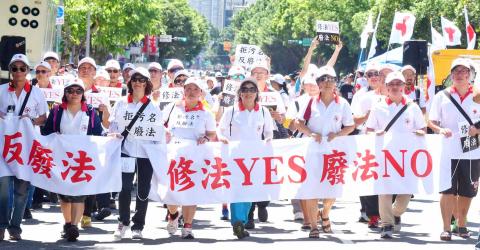Members of the Red Cross Society of the Republic of China yesterday rallied outside the legislature in Taipei to protest against the pan-green camp’s proposals to abolish a special act governing the organization’s operations.
About 300 members from the society’s chapters nationwide participated in the protest, with some coming from Hualien and outlying Kinmen county.
Shouting slogans, the protesters said the law could be amended, but that it must not be nullified, as they called for social “stigma” to be dismissed.

Photo: Liu Hsin-de, Taipei Times
Democratic Progressive Party (DPP) and New Power Party (NPP) legislators have proposed abolishing the Red Cross Society Act of the Republic of China (中華民國紅十字會法) over perceived loopholes they say have made the organization an offshoot of the Chinese Nationalist Party (KMT), created unfair stratification for younger members and allowed it to avoid public scrutiny when appropriating donations.
Several KMT legislators took to the stage to give speeches in support of the society.
KMT Legislator Lai Shyh-bao (賴士葆) said he is against the “lame” political persecution launched by the pan-green camp against the society, adding that all 35 KMT lawmakers would attempt to block the passage of the bill.
KMT Legislator Arthur Chen (陳宜民) said that abolishing the act would be a mistake, as more than 150 nations have promulgated special legislation for the Red Cross.
KMT Legislator Apollo Chen (陳學聖) lauded the society’s efforts to rescue people during emergencies, adding that, with the number of lives the society has saved, its members should go to heaven, but the pan-green camp is attempting to send them to hell.
“I wonder why ‘Big Green’ DPP and ‘Little Green’ NPP are so eager to get rid of you... Society has been inverted. What was good is now evil, and what was evil is now good,” Apollo Chen said.
KMT Legislator Alicia Wang (王育敏) said that the act must not be abolished and the society must not be disbanded, as the organization has served as an important channel for the nation to boost its international space by participating in international relief efforts.
Following a discussion with the DPP caucus in May, the Executive Yuan said that it was positioned to “retain the organization, but abolish the special act.”
Society president Wang Ching-feng (王清峰) said that the Red Cross’ government-appointed directors and supervisors could be removed in the wake of criticism that there are KMT-appointed “guardians” in the organization.
She said if the public does not like the rule allowing the organization’s president to serve unlimited terms, the act could be changed to limit the number of terms the vice president can serve to one.
If the public has doubts over the way donations are spent during emergencies, the act could be amended to include provisions stipulating how the money is to be spent, she added.
Wang Ching-feng said she would request a constitutional interpretation from the Council of Grand Justices if the act is abolished, adding that she would retire if the act is amended or abolished.

A magnitude 4.9 earthquake struck off Tainan at 11:47am today, the Central Weather Administration (CWA) said. The hypocenter was 32.3km northeast of Tainan City Hall at a depth of 7.3km, CWA data showed. The intensity of the quake, which gauges the actual effect of a seismic event, measured 4 in Tainan and Chiayi County on Taiwan's seven-tier intensity scale, the data showed. The quake had an intensity of 3 in Chiayi City and County, and Yunlin County, while it was measured as 2 in Kaohsiung, Nantou County, Changhua County, Taitung County and offshore Penghu County, the data showed. There were no immediate reports of

Weather conditions across Taiwan are expected to remain stable today, but cloudy to rainy skies are expected from tomorrow onward due to increasing moisture in the atmosphere, according to the Central Weather Administration (CWA). Daytime highs today are expected to hit 25-27°C in western Taiwan and 22-24°C in the eastern counties of Yilan, Hualien, and Taitung, data on the CWA website indicated. After sunset, temperatures could drop to 16-17°C in most parts of Taiwan. For tomorrow, precipitation is likely in northern Taiwan as a cloud system moves in from China. Daytime temperatures are expected to hover around 25°C, the CWA said. Starting Monday, areas

A Taiwanese software developer has created a generative artificial intelligence (AI) model to help people use AI without exposing sensitive data, project head Huang Chung-hsiao (黃崇校) said yesterday. Huang, a 55-year-old coder leading a US-based team, said that concerns over data privacy and security in popular generative AIs such as ChatGPT and DeepSeek motivated him to develop a personal AI assistant named “Mei.” One of the biggest security flaws with cloud-based algorithms is that users are required to hand over personal information to access the service, giving developers the opportunity to mine user data, he said. For this reason, many government agencies and

Taiwan has recorded its first fatal case of Coxsackie B5 enterovirus in 10 years after a one-year-old boy from southern Taiwan died from complications early last month, the Centers for Disease Control (CDC) said yesterday. CDC spokesman Lo Yi-chun (羅一鈞) told a news conference that the child initially developed a fever and respiratory symptoms before experiencing seizures and loss of consciousness. The boy was diagnosed with acute encephalitis and admitted to intensive care, but his condition deteriorated rapidly, and he passed away on the sixth day of illness, Lo said. This also marks Taiwan’s third enterovirus-related death this year and the first severe